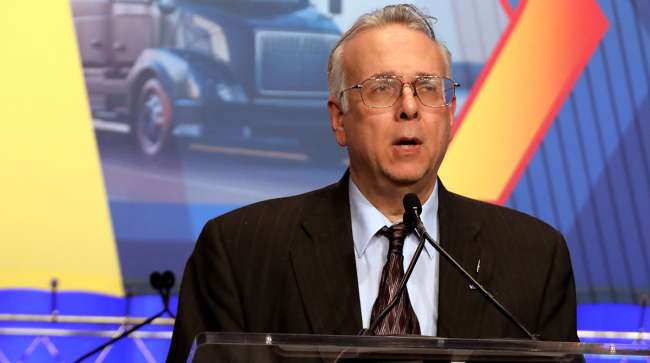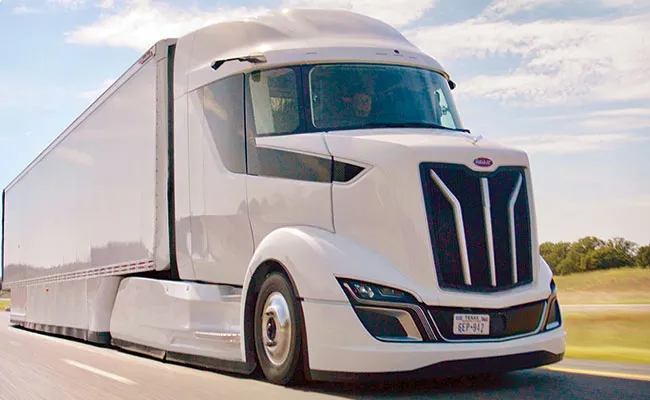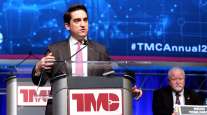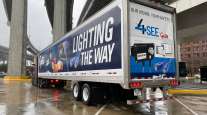Senior Reporter
TMC Has Full Agenda Planned for Annual Meeting

[Stay on top of transportation news: Get TTNews in your inbox.]
TMC Executive Director Robert Braswell said challenging technical issues and industry innovation will be in the spotlight March 4-7 in New Orleans.
That’s when the 2024 Technology & Maintenance Council Annual Meeting and Exhibition will unfold. The event, which showcases the latest in products, equipment and updates, is expected to draw more than 5,000 attendees to the Ernest N. Morial Convention Center.
TMC is a division of American Trucking Associations.
“There are several big issues that TMC is facing,” Braswell told Transport Topics. He emphasized the need for the industry to come together not only on the type of unit to be used for electric trucks as they become more available, but also on standardizing much of the nationwide infrastructure to supply the power that will be needed in far greater capacity.
Rev up your #trucking industry insights at #TMCAnnual24 in New Orleans, March 4-7. Immerse yourself in technology, education, and networking for fleet excellence. This is an event planned by fleets, for fleets and you don’t want to miss it! https://t.co/cCFKgXEJ8Q — Technology & Maintenance Council (TMC) of ATA (@TMC4Trucks) January 29, 2024
“How do you spec these different charging stations, what will be required in terms of the wiring and the structure and the buildout of those stations, and how long it will take for that infrastructure to come online?” he said. “In some areas, like Southern California, you have a better chance of getting it done, compared to, let’s say, the middle of Iowa.”
Globally, two competing charging systems are in the marketplace. Japanese engineers have developed the CHAdeMO system, while Europeans have the CharIN portal.
Braswell said that trucking companies should now work on developing a relationship with their electric service providers as they transition to EVs, battery-electric or hybrid vehicles.
There are many questions that fleets have, particularly when it comes to the time frame to develop [EV] infrastructure.
TMC Executive Director Robert Braswell
“There are many questions that fleets have, particularly when it comes to the time frame to develop the infrastructure,” he said, “and how do you deal with the fact there are more than 3,500 electric service providers in the U.S., and it’s important to know how to interface with each of these separate entities when you are trying to establish an electric vehicle fleet.”
The move toward alternative fuels comes when the original equipment manufacturers design and produce trucks with the highest mpg fuel-economy ratings and operate with the lowest emissions in history.

SuperTruck II on the road. (Peterbilt via Facebook)
“Our technical session on the latest findings on the Department of Energy’s SuperTruck II and III programs is so important,” Braswell said. “We are very keen to see what type of adaptations we can make in fleets based on the findings that they achieved. “All of the different companies — Cummins, Daimler, Navistar, Paccar, Volvo — have all created super trucks that can achieve 16 miles per gallon and fuel economy, which is outstanding. We want to transfer this technology to the existing fleets as a bridge to future powertrain designs. This is fantastic, and TMC is very interested in that.”
Since 2009, DOE and the OEMs have worked to develop a zero-emission, heavy-duty truck capable of regional and longhaul freight deliveries. Now, at 16 mpg, that is a 160% improvement in fuel efficiency since the introduction of the first truck. The OEMs have reached that higher goal through extensive changes to the vehicles’ engines, transmissions, drivetrains and aerodynamics.
#TTNewsmakers: On 2/20, @TMC4Trucks Executive Director Robert Braswell joins Dan Ronan to discuss TMC Annual, how conversations become industry best practices, & why attendees keep coming back year-after-year. Sponsored by @rushtruckcenter.
Register: https://t.co/AE0yNu6Uk5 pic.twitter.com/qSGxmZL9Y2 — Transport Topics (@TransportTopics) February 12, 2024
Braswell said the industry is in a transitional period in terms of different energy sources, and TMC intends to continue taking a leading role.
“There will not be one particular solution that best suits every application in a commercial vehicle. Certainly, battery-electric will play a role in key areas, like last-mile and regional. Hydrogen may be better for the long haul,” he said. “If we get some of the infrastructure challenges in place, maybe CNG will continue to have a role to play, as well as liquid natural gas, in addition to conventional diesel and renewable diesel, which is a green fuel. TMC will be at the forefront trying to develop best practices for fleets to manage their assets.”
COMTO's April Rai offers tips to increase workforce diversity and grow profits.. Tune in above or by going to RoadSigns.ttnews.com.
Braswell said growing cybersecurity threats directed at the trucking industry will also be a focus.
“TMC and the ATA have been working in concert on the issue of the cyberthreats,” he remarked. “We need to make sure that fleets are best prepared to handle these new challenges that will happen, either in the back office or the onboard side of the vehicle technology.
“A lot of this is good housekeeping regarding closing off what needs to be closed off in the back office and onboard the vehicles. Now, we have a cybersecurity task force developing standards and recommended practices that deal with cybersecurity, including cybersecurity insurance.”
Braswell told TT that TMC officials are optimistic that the technician shortage is improving, even as training options for heavy equipment can be challenging.
“There are just not as many vocational points of entrance as there once were. A lot of these programs have dried up, and that puts pressure on ways to get their training,” he said. “It’s not so much there is a shortage of applicants for the industry, it’s more a shortage of qualified applicants.”
Want more news? Listen to today's daily briefing below or go here for more info:






